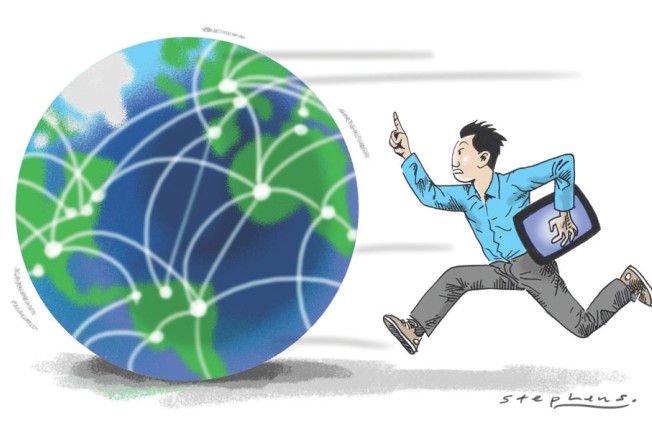China risks being left behind unless it builds a web that's open to all
Anne Jellema says a freer, more accessible internet can serve China in many ways, not least by making it more competitive and innovative, the key to achieving its 'Chinese Dream'

Last month saw the launch of this year's World Wide Web Foundation annual Web Index report, which is the world's first measure of the web's contribution to social, economic and political development in 81 countries.
Sweden topped the rankings, ahead of Norway. South Korea, at No 10, was the highest-placed Asian country.
China, however, is being fast outpaced - even by smaller countries such as Costa Rica, Colombia and the Philippines - in harnessing the web to accelerate development and innovation. Ranking 57, it is the country that World Wide Web inventor Sir Tim Berners-Lee identified as showing the most room for improvement.
There are two main issues China must address to improve its performance and remain competitive in a fast-digitising world. First, China needs to do much more to make the internet affordable and accessible for everyone.
In the Web Index category that measures whether countries have invested in affordable access to high-quality internet infrastructure, as well as investing in the education and skills citizens need to use the web well, China is placed above countries such as Saudi Arabia, India, Indonesia and Morocco.
However, for the 359 million Chinese citizens who live on US$2 a day or less, access to mobile or fixed broadband is out of reach - costing between 25 per cent and 38 per cent of their monthly income.
Second, China must deal with the challenge of privacy and freedom online. The Web Index report found that China censors web content extensively and has no meaningful safeguards against online spying by security agencies.
As Edward Snowden has made clear, this can no longer be considered a developing-world problem alone: the Web Index also highlights the United States, Canada, Britain, Australia, New Zealand and Sweden, among others, for "inadequate" safeguards against government spying. However, only Saudi Arabia and Vietnam were placed below China on the index measure of freedom and openness online.
China's cybercafes are now 40 per cent owned by chains, which are easier for authorities to regulate than independent businesses. In the past year, traffic on virtual private networks (VPNs) - used to bypass censorship - has been disrupted, sometimes obstructing commercial use; regulators ordered online video services to censor short films in July 2012, when users adopted them to bypass film and broadcast restrictions; security agents in Tibet and Xinjiang have searched cellphones to pre-empt allegedly anti-state activity; and a Criminal Procedure Law amendment took effect in January, strengthening legal grounds for detaining anti-state suspects incommunicado.
This is, of course, a concern for those who believe that the government must begin to extend basic civil liberties in order for it to maintain legitimacy and stability in the face of rising social tensions.
Regardless of the form of government practised, it is important for citizens in any country to have outlets to discuss concerns, complain and protest - and increasingly, citizens seek those outlets online.
Pervasive surveillance and censorship should also be a worry for those who question whether China can move up the value chain fast enough to remain competitive - a transition that requires harnessing the full power of the open web to catalyse greater innovation and creativity.
The "Chinese Dream" requires building a web that is accessible to all and that can power innovation and creativity in political, social and economic spheres. Step by step, website by website, family by family, China must become a part of the World Wide Web's global conversation.
We hope the research in the index can help campaigners, policymakers and also the Chinese government to understand the scale of the task ahead.
Anne Jellema is chief executive officer of the World Wide Web Foundation. Established by Sir Tim Berners-Lee, the foundation webfoundation.org seeks to establish the open web as a global public good and a basic right